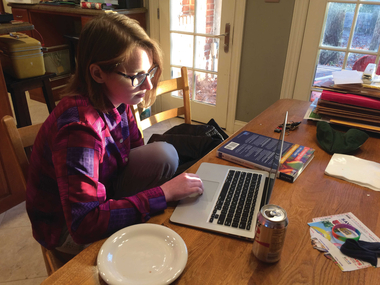Faking It

by Emma Rose Kraus
Journalism intern
Lately there has been an onslaught of fake news sources showing up on our social media feeds and now, with some of these deceptive stories turning up on main-stream news stations, the public is both more cautious of and more susceptible to the false information being spread under the guise of “news” than ever before.
“No matter how much I’d like to believe it’s just directed at [others], I know there’s plenty of false news directed at me,” says Julia Kraus, 17-year-old staff writer and opinion editor for Riverfield Country Day School’s The Commons. “Regardless of how much less prevalent it is, I still see it.”
And while Kraus may see it from the viewer’s perspective, Elijah Wright, a data enterer and writing clerk for a larger Tulsa-based media organization, sees the process of news selection and less than reputable reporting from behind the scenes.
“Something’s up, something’s always up,” Wright confides. “There’s definitely a selection process, and there’s a lot of stuff that never sees the light of day.”
According to Wright, this selection process could shape the news by using other, just as misleading, reporting.
“What creates this separation of information?” asks Wright. “Why do people like me feel like I can’t relate to the newspaper? Are they really catering to all Tulsans or simply to the middle and upper class?
“There’s a definite divide in what I see in news between what people really [see] and then what they actually write down. It’s like people are scratching each other’s backs; just being nice to each other.”
This method of catering to specific audiences can be seemingly miniscule, an ordinary system of bias, but it points to an even larger problem.
“There is a continuous battle with the conflict of interest regarding ‘do I optimize for the most possible profit because that’s what I think I’m supposed to do versus how far do I push that and stop being human?’” Stephen Fishman, a technical and political writer for several online magazines, asks.
Fishman uses CNN as an example in his argument saying, “Their orientation is such that profitability and audience share and sensationalism are significantly ahead on a day-to-day basis of making certain of the veracity of what they’re saying.”
So, what can be done when the news has become a corporate entity that functions for clicks and likes instead of integrity?
According to Kraus, it’s just going to take time.
“Right now, the older generation is where I see most false news,” Kraus says. “[They] are scared of what America has become and is becoming.”
But, how do we combat the fear that has people taking to sensationalized stories and clickbait? Kraus says it could be just as simple as talking to others.
“Spend time with the [older generation],” she urges. “Show them we aren’t scary.”
Fishman, on the other hand, says this problem is far from over.
“The democratization of the press, which makes it possible for anyone to have a voice anywhere allows people to make a significant amount of money and a significant amount of audience engagement from pandering to people’s echo chambers,” he says.
“What used to be just the content of talk radio has become a viable business model for those owning a broadcast network.”
Wright agrees, telling people to stay wary. “People are trained in linguistics which means they know exactly how words affect the human mind,” Wright says. “There are people whose job it is to come up with phrases like ‘sources say’ or ‘police report’, which could honestly mean nothing at all.”
“We may see more news organizations forced to depend on the philanthropy of mega-billionaires [just to] compete with the monetization of opinion that’s been popularized,” concludes Fishman.
Whatever the solution, we can be sure at this moment that there is a definite problem in how information is relayed; specifically, which information is deemed important and how accurately it is then presented?
_
Copyright 2017 The Gayly - 1/3/2017 @ 5:05 a.m.





